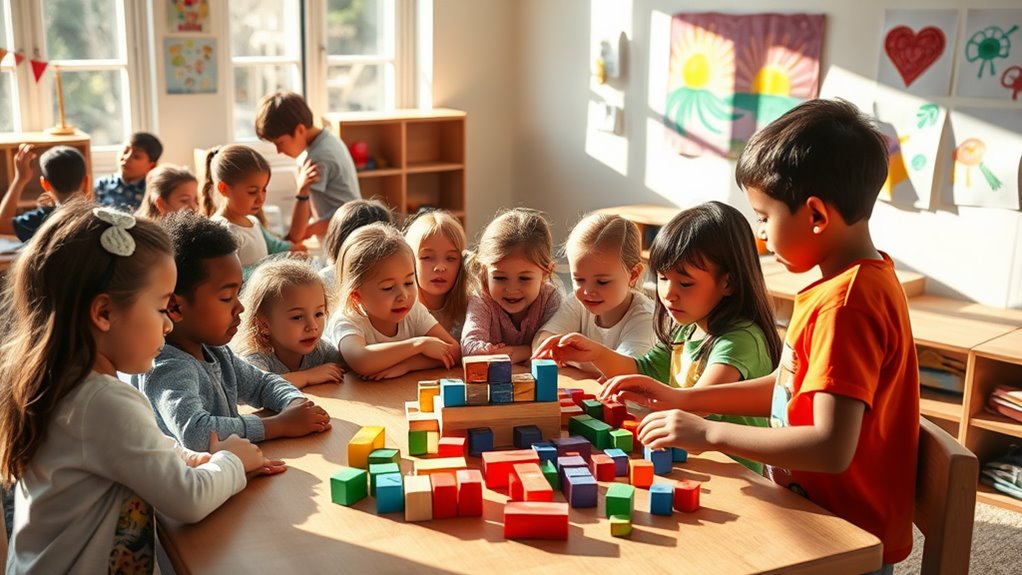The Impact of Montessori Parenting on Social Skills
When you’re exploring the landscape of parenting, you might wonder how different approaches shape your child’s social skills. Montessori parenting, with its emphasis on collaboration and independence, invites children to engage meaningfully with peers, fostering essential skills like empathy and communication. You may find that as your child participates in mixed-age activities, they begin to build a strong foundation for future relationships. But how exactly does this approach influence their interactions beyond the classroom? The answer might surprise you.
Montessori Parenting Overview
Montessori parenting embraces a child-centered approach that fosters independence and self-directed learning. In this style of parenting, you’ll notice that your child is encouraged to explore their interests at their own pace. You’re not just a caregiver; you’re a guide, helping them navigate their world while allowing them to make choices. This method empowers kids to take charge of their learning, sparking their natural curiosity and creativity.
You’ll find that Montessori parenting emphasizes hands-on experiences, which make learning more engaging. By providing a prepared environment filled with age-appropriate materials, you’re setting the stage for exploration and discovery. This approach helps your child develop a sense of responsibility and confidence, as they learn to manage their activities and make decisions.
Additionally, Montessori parenting promotes respect for others and the environment. By modeling these values, you’re teaching your child essential social skills, such as cooperation, empathy, and communication.
It’s not just about academics; it’s about nurturing well-rounded individuals who can thrive in social settings. Overall, this unique parenting style creates a solid foundation for lifelong learning and healthy relationships.
Key Principles of Montessori
How do the key principles of this educational approach shape a child’s development?
Montessori education revolves around several core principles that foster independence, respect, and a love for learning. First, it emphasizes child-led learning, allowing you to observe your child’s interests and passions. This approach nurtures their autonomy, making them feel more confident in their abilities.
Next, the prepared environment plays an essential role. In a well-organized space, children can choose activities that captivate them, encouraging exploration and concentration. You’ll notice that this freedom helps develop their decision-making skills and responsibility.
Another significant principle is hands-on learning. By engaging with materials, your child grasps concepts more deeply, making connections between theory and practice. This tactile experience is crucial for cognitive development.
Lastly, mixed-age classrooms promote collaboration and social interaction. When children of different ages work together, they learn from one another and build important social skills.
Importance of Social Skills
Recognizing the significance of social skills is essential for your child’s overall development and future success. Social skills, like sharing, listening, and collaborating, form the foundation for healthy relationships. They enable your child to communicate effectively, express feelings, and understand others, which is critical in both personal and academic settings.
When your child develops strong social skills, they’re more likely to navigate social situations with confidence and ease. These skills help them make friends, work well in teams, and resolve conflicts peacefully. Imagine your child engaging in group activities without hesitation, feeling comfortable voicing their opinions while also respecting others.
Moreover, social skills contribute to emotional intelligence, helping your child recognize their own emotions and those of others. This awareness not only enhances their relationships but also fosters empathy, an essential trait in today’s interconnected world.
In essence, investing time in developing your child’s social skills lays the groundwork for their future interactions. These skills not only influence their personal life but also play a significant role in their academic achievements and career success.
Role of Independence
Independence plays an essential role in your child’s social skills development. When you encourage your child to take initiative in daily tasks, they build confidence and learn to navigate the world around them. This independence allows your child to make choices, solve problems, and communicate their needs effectively.
As they engage in self-directed activities, they gain valuable experiences that shape their interactions with peers. For instance, when your child decides to pick out their clothes or prepare a simple snack, they learn how to express their preferences and negotiate solutions. These small victories foster a sense of ownership and pride, which is vital for social engagement.
Moreover, independence helps your child develop resilience. When faced with challenges, they learn to cope and adapt, making them more likely to approach social situations with a positive attitude. They become adept at understanding others’ feelings, as they practice empathy in their everyday interactions.
Ultimately, fostering independence not only equips your child with practical skills but also lays the groundwork for healthy relationships in the future. Embracing this aspect of Montessori parenting can profoundly influence your child’s ability to connect socially with peers.
Cooperative Learning Activities
Cooperative learning activities often play an important role in developing your child’s social skills. In a Montessori environment, children engage in group projects that require teamwork. This collaboration encourages them to communicate effectively, share ideas, and negotiate solutions, all of which are key components of strong social skills.
When your child works on a task with peers, they learn to appreciate different perspectives. They’re not just focused on their own ideas; instead, they must listen and adapt to others. This process fosters respect and understanding, which are crucial for building friendships.
Moreover, cooperative learning helps your child develop problem-solving skills. As they encounter challenges while working with others, they learn to brainstorm solutions and reach consensus. This experience boosts their confidence, as they realize they can contribute meaningfully to a group.
Participating in these activities also enhances your child’s ability to resolve conflicts. When disagreements arise, they’ll practice finding common ground and compromise, essential skills for managing social interactions throughout life.
Empathy Development Techniques
Empathy is an essential social skill that can be nurtured through various techniques in a Montessori parenting approach. One effective method is role-playing. By encouraging your child to act out different scenarios, you help them step into someone else’s shoes. This practice deepens their understanding of others’ feelings and perspectives.
Another great technique is storytelling. Sharing stories that highlight diverse experiences can spark discussions about emotions and moral choices. Ask open-ended questions about the characters’ feelings to prompt your child to think critically about empathy.
You can also model empathetic behavior in your daily interactions. When you show kindness and understanding towards others, your child observes and learns from your example. This modeling reinforces the importance of empathy in real-life situations.
Lastly, engaging in community service activities as a family can enhance your child’s empathy. Volunteering exposes them to different life situations, helping them understand and appreciate the challenges others face.
Communication Skills Enhancement
Enhancing your child’s communication skills is essential for their social development and overall success. In a Montessori environment, children learn to express themselves clearly and listen actively, which builds their confidence and helps them connect with others. You can foster this by encouraging conversations at home. Ask open-ended questions that prompt your child to share their thoughts and feelings.
Reading together is another effective way to boost communication skills. Choose engaging books that spark discussions. Encourage your child to predict what happens next or to describe their favorite characters. This practice not only improves vocabulary but also enhances comprehension.
Additionally, model good communication. Show your child how to maintain eye contact, use respectful language, and listen attentively when others speak. Role-playing different scenarios can also be fun and beneficial. Try acting out various social situations where they can practice initiating conversations or responding appropriately.
Lastly, create opportunities for your child to interact with peers. Playdates or group activities can help them practice their skills in a natural setting.
With consistent encouragement and practice, your child will develop strong communication skills that serve them well throughout their life.
Conflict Resolution Strategies
When conflicts arise among children, it’s crucial to equip them with effective resolution strategies that promote understanding and cooperation. One of the first steps you can take is to encourage open communication.
Teach the children to express their feelings and perspectives without blaming or shouting. You might say, “I feel upset when you take my toy because I want to play with it too.” This approach sets a positive tone for dialogue.
Next, guide them in active listening. Encourage them to really hear each other out, nodding or repeating what they’ve understood. This shows respect and helps build empathy.
You can introduce the idea of finding common ground. Ask questions like, “What can both of you agree on?” This helps them focus on solutions rather than problems.
Practical Life Experiences
Practical life experiences are essential in Montessori parenting, as they help children develop real-world skills while fostering independence and responsibility. When you involve your child in everyday tasks, like cooking, cleaning, or gardening, you’re giving them tools they need to navigate life confidently. These activities teach them how to care for themselves and their environment, which is vital for building social skills.
As your child engages in practical tasks, they’re not just learning how to sweep the floor or set the table; they’re also mastering important social skills like cooperation and communication. For example, when they help prepare a family meal, they learn to share responsibilities, ask for help, and express their ideas. These interactions encourage teamwork and help them understand the importance of contributing to a group.
Additionally, practical life experiences promote patience and perseverance. They learn that some tasks take time and effort, which builds resilience. By allowing your child to tackle these challenges, you’re nurturing their ability to face social situations with confidence.
Community Involvement Benefits
Participating in community activities not only strengthens your child’s social skills but also fosters a sense of belonging and responsibility. When your child engages in local events or volunteer opportunities, they learn to interact with others in meaningful ways. This interaction helps them develop essential communication skills and boosts their confidence in social settings.
In these environments, your child can practice teamwork as they collaborate with peers and adults alike. They learn to listen, share ideas, and appreciate different perspectives, which are vital skills for building friendships. Additionally, being part of a community teaches them the importance of contributing to something larger than themselves, instilling values like empathy and respect.
You’ll also notice that as your child becomes more involved, they start to feel a deeper connection to their surroundings. This sense of belonging can enhance their emotional well-being, making them feel valued and understood within their community.
Plus, as they witness the positive impact of their actions, they’ll cultivate a sense of responsibility that carries into other areas of their lives. Overall, community involvement is a wonderful way to nurture your child’s growth while enriching their social skills.
Observational Learning in Action
Observational learning plays a significant role in how children develop social skills, especially in community settings. When you engage your child in group activities, they naturally watch and imitate the behaviors of peers and adults. This learning method is powerful, as it allows them to understand social cues, body language, and emotional expressions without direct instruction.
Imagine your child at a park, observing how others share toys and take turns. They notice the smiles that accompany kind gestures, and soon enough, they’re trying it out themselves. This kind of learning fosters empathy and cooperation, as children see the positive reactions to friendly interactions.
In Montessori environments, observational learning is encouraged through mixed-age groups. Younger children learn from older peers, while older kids reinforce their knowledge by modeling positive behaviors.
You might find your child picking up phrases or manners they’ve seen others use, which can enhance their communication skills.
Long-term Impact on Relationships
Children who regularly engage in Montessori-based social interactions often develop stronger, healthier relationships as they grow. This method emphasizes collaboration, respect, and empathy, which are essential for building lasting connections with others. When your child participates in group activities, they learn to listen, share, and communicate effectively. These skills form a solid foundation for their future relationships.
As they shift into adolescence and adulthood, individuals raised in Montessori environments are more likely to maintain meaningful friendships. They’re accustomed to resolving conflicts peacefully and understanding diverse perspectives, which helps them navigate complex social dynamics. You’ll notice that their ability to express feelings and needs clearly fosters deeper bonds with friends, family, and colleagues.
Moreover, Montessori parenting encourages emotional intelligence, allowing kids to recognize and manage their emotions better. This awareness contributes to healthier romantic relationships later in life.
As adults, they often exhibit higher levels of social competence and emotional resilience. They’re equipped to handle challenges and support those they care about, creating a network of trustworthy and supportive relationships throughout their lives.
Investing in Montessori parenting can lead to a lifetime of fulfilling connections for your child.





